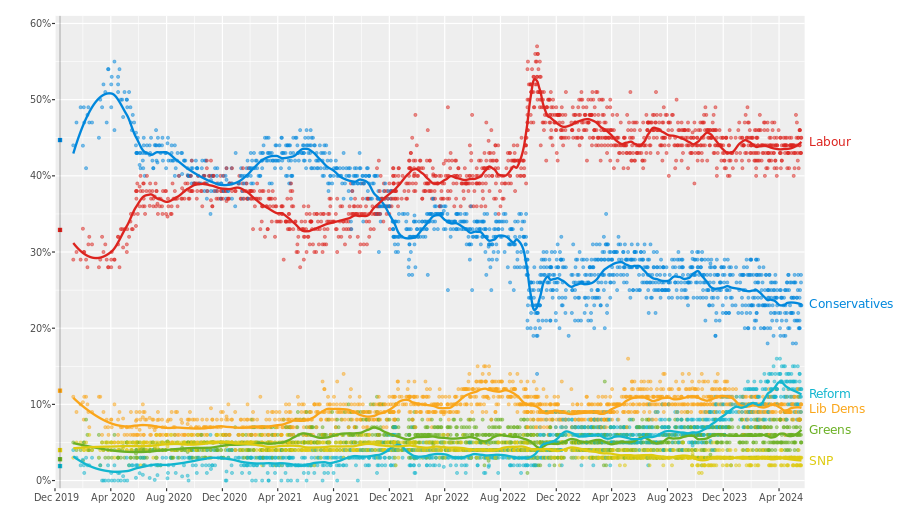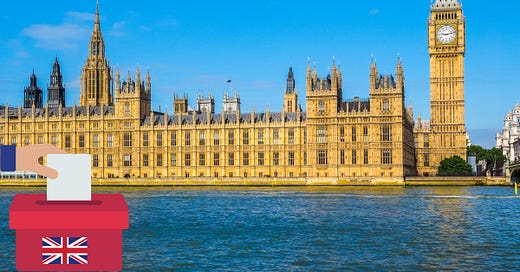The British General Election
Britain is set to move centre-left after 14 years of right-wing Conservative-led rule
Prime Minister Rishi Sunak announced yesterday that Britain is set to go to the polls in just six weeks. The British general election will take place on the 4th of July, somewhat earlier than many had expected.
If you are a bit of an election nerd like me you may have been perhaps delighted with the prospect of an earlier-than-expected election in Britain this summer. Just from the nonpartisan point of view of pure political science, the British election is, to me at least, something similar to what the British Open is to golf, it is one of the most exciting majors in the calendar, a not-to-be-missed event. It has a long tradition, attracts widespread interest, and has historical importance.
The British Parliament can claim the prestige of one of the oldest representative assemblies in the world, with roots tracing back to the 13th century. The Palace of Westminster, where the House of Commons is located, has been a centre of power for over 900 years. Its first-past-the-post electoral system is also one of the most decisive political systems in the world, and better equipped to produce clear winners. In the post-war era, hung parliaments have tended to be rare, and coalition governments have tended to be uncommon. In Britain, the people get a real chance to truly change the direction of their government. If they have had enough of the current government, they can throw them out.
2024 is an important year for democracies around the world, with key elections in the United States, the European Union, and of course, the enormous democratic electoral process currently underway in India, the world’s largest democracy. The British general election is without doubt, among the most important elections in the global calendar this year. Its outcome will influence Britain's relationship with the wider world and its post-Brexit relationship with its adjacent European neighbours, its major trading partners.
Britain is a G7 country, one of NATO’s two major European nuclear military powers. It is also one of only two European countries to be a permanent member of the UN Security Council. That matters in today's world where geopolitics, great power politics, and security considerations are high on the international agenda.
Britain also maintains a lot of soft power in the world. It is home to some of the world’s best-ranked universities and has a significant cultural influence in the English-speaking world. The results of this election will also be important for politics within the British home nations. How Scotland votes, will go a long way towards answering the question of Scottish independence in the medium term. Northern Ireland’s future within the United Kingdom will also be influenced by the results in the province.
The polls have suggested for the last few years that the outcome of the next election will be a landslide victory for the British Labour Party, led by Sir Keir Starmer. Recent polling suggests that the Labour Party currently has a lead of between 25-30%. Indeed, the Labour Party has consistently led in British polling data going back as far as December 2021.

If these numbers hold up on polling day, then this would bring an end to 14 years of right-wing Conservative-led rule, which has seen five prime ministers take office, most for relatively short periods. This has included the easily forgotten prime minister, Liz Truss, who only lasted 49 days, and the current PM, Rishi Sunak, who is just over a year and a half in Downing Street. There has also been a revolving door in the Foreign Office, with eight foreign secretaries during this period, including the former Prime Minister David Cameron, who is the current foreign secretary and who had originally led the Conservatives back to power in 2010, after more than a decade of New Labour.
A week is a long time in British politics and a lot can happen between now and polling day. An election was widely expected in the autumn, around the same time as the U.S. election. However, it is probably best to hold the British election earlier, if it helps avoid the possibility that the issues in the U.S. election don’t spill over into the UK election.
The Prime Minister may have decided to gamble on a surprise summer election as it perhaps, offers both him and his party its best chance in an election that they are still most likely to lose. After going to the King and seeking the dissolution of parliament, it is simply too late now for the Conservative MPs to challenge his leadership ahead of polling day.
Strategically now might offer the best chance to save some Conservative seats in what could be a bloodbath. In their favour, there are some good talking points for the government going into this election campaign, inflation is down to near the 2% target rate, the UK is out of recession and grew by 0.6% in the first quarter, the fastest in two years. The Prime Minister can also claim victory with his flagship Rwanda policy, which is intended to “stop the boats”, by deporting unsuccessful migrants to the African country. Flights are due to commence departure this summer. There is also the strategic advantage of catching the opposition parties by surprise, who were probably more likely to be basing their election plans on a date later this year. With six weeks to go, there is also a perception of a lower probability for new problems to arrive on the Prime Minister’s desk. Moreover, people tend to be in a better mood in the summer sun. That may be further improved if a British team is successful in this summer’s European football championship. For those of us who like golf, the election will also be over and done with, before the British Open in mid-July.
However, there are also many reasons why this government should not be re-elected. Conservative-led rule over the last decade had, I think it is fair to say, brought increasing instability and uncertainty in Britain’s relationship with both itself and its closest European neighbours. Britain today looks so much different from how it was when the former Labour Prime Minister, Gordon Brown, handed over the keys of 10 Downing Street to David Cameron 14 years ago.
The embrace by some factions of the governing class of the politics of right-wing national populism, characterized by appeals to popular and nationalist sentiment, has been a defining feature of this period in British history. Politics has moved further to the right, and away from the centre-right that would be normally expected of a typical Conservative government.
Austerity was also a key defining feature of the Tory years. Such an approach to public policy, however, has not delivered the tangible political results that matter to people, such as a higher standard of living. The average Briton today is by some measures worse off in real terms than when the novel single-term Conservative-Liberal Democrat coalition government came to power in 2010. Research published earlier this year by the think tank, Centre for Cities, found that a combination of poor productivity growth and a decline in housing affordability had led to the average person being £10,200 worse off, at the national level, than if the economy had grown at its pre-2010 trajectory.
Damage has also been done to Britain's relationship with its closest neighbours. The Brexit referendum was perhaps the biggest political gamble in modern UK history since the Suez Crisis in 1956. It was not so much that Britain chose to leave the European Union, which at the end of the day is the will of the people, it was more so the manner in which the government conducted its Brexit business in the aftermath. It became quite clear, quite quickly, that Britain didn’t know what it wanted. With no real plan for a post-Brexit Britain, both Britain and Europe were left to improvise within the political vacuum that Brexit created. “Brexit Means Brexit” became the slogan, but many Britons were disappointed to find out what a post-Brexit Britain meant in reality, especially when they discovered that it was now more difficult to trade with customers in Europe, or take a hassle-free holiday in the sun.
So much has been written over the last number of years about the challenges facing liberal democracy and the liberal international order more broadly. Brexit and the election of Donald Trump as President of the United States in 2016, are frequently highlighted as significant examples of a broader trend away from values associated with liberal democracy, such as cooperation, multilateralism, and protection of individual rights and freedoms. Instead, there has been a rise in populism, emphasis on national borders, and divisive rhetoric. These developments have raised concerns about the erosion of liberal democratic norms and the potential impact on global governance and stability.
Britain was one of the early riders during the last wave of populism, however, with the likely change of the party of government for the first time since Brexit, there is now a real opportunity for a new Labour government to bring British politics back closer towards the more predictable and stable political centre. We don’t know yet what is going to happen in the U.S. election in November, we will have to wait and see if there really will be a Trump restoration. However, the new British government could play a vital influential role in helping restore liberal democracy to a more pragmatic mode, where problem-solving and compromise are prioritized, away from all the drama of populism and performative politics and back towards the good old boring job of actually getting things done. If global Britain should have a global purpose going forward, that should be it. Others will follow Britain’s lead.
In the coming weeks, I will be returning to the British Election campaign, and in particular, I will look at what policies we might expect to see from the next British government and what they may mean for Britain’s relationship with the wider world.






An audio version of this article is also available by visiting the podcast section.
Thank you for reading Kevin Unscrambles, don't forget to subscribe and get full access.